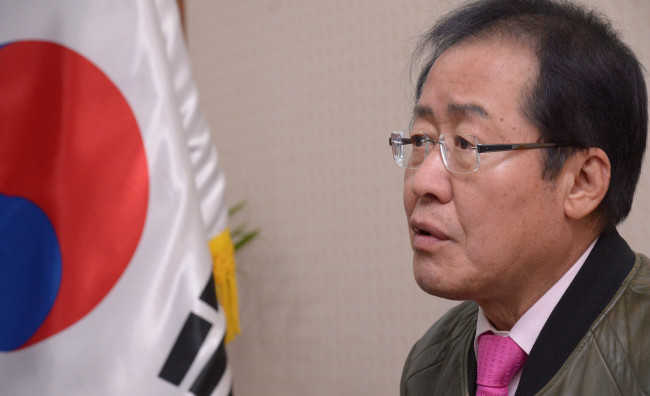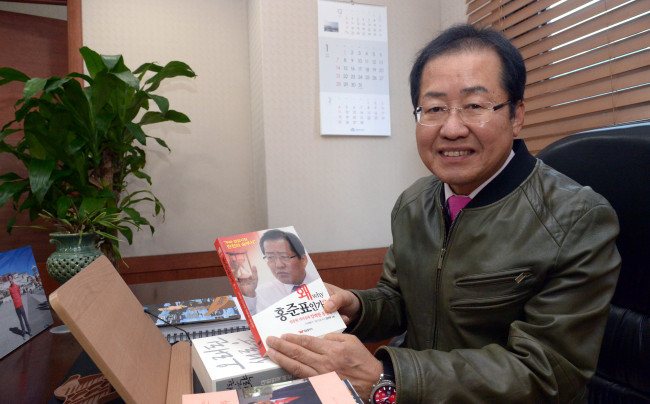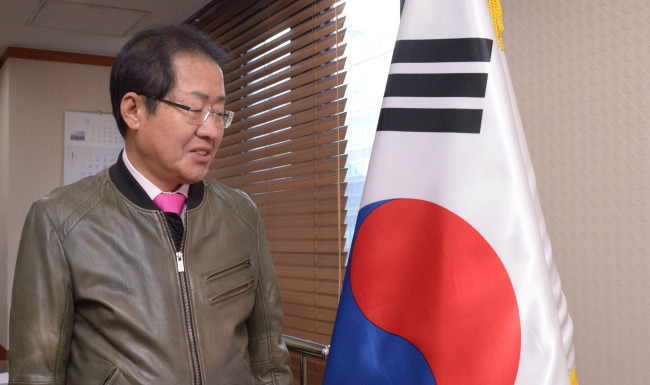While the long-frozen inter-Korean relations appear headed for a thaw following an agreement to hold high-level talks on North Korea’s possible participation in the PyeongChang Winter Games on Tuesday, South Korea’s main opposition leader warned against the high possibility of a contingency on the peninsula after the sports event.
In an interview with The Korea Herald On Jan. 2, conservative Liberty Korea Party Chairman Hong Joon-pyo warned the country could face a critical situation before mid-April, but the government is not acting appropriately to prevent it.
 |
Liberty Korea Party Chariman Hong Joon-pyo poses in his office at the party`s heaquarters in Yeouido, Seoul, on Jan. 2. (Chung Hee-cho/The Korea Herald) |
“The national security crisis will deepen, and it will be serious. If the United States starts a preventive war, the deadline would be mid-April,” Hong said in his office at the party headquarters on Yeouido, Seoul.
Hong, who had paid a five-day visit to the United States in October, said the US projects that the North will reach the final stage of its nuclear-tipped missile development by the end of March.
“For the North, they would want to avoid the leafy season, which would make it more difficult to accurately hit its target.”
Hong did not reveal if he was informed of this during his US trip.
“Do not get me wrong, it would not be a pre-emptive strike,” he added. “A pre-emptive strike is striking the enemy just before a war, assuming a war is imminent, while a preventive war involves attacking the enemy without assuming an imminent war, to prevent a war.”
In the US trip, the main opposition party leader made his case for the redeployment of tactical nuclear weapons in South Korea, insisting it was the only way to counter the threats posed by North Korea’s nuclear missile development.
There, he also claimed the North’s development of intercontinental ballistic missiles is designed to attack the South for forceful unification, an argument that runs counter to liberals’ belief that the North’s ICBM development is aimed at regime protection.
The main opposition Liberty Korea Party continues to hold the position that tactical nuclear weapons -- withdrawn from the country in 1991 -- should be redeployed in South Korea for the purposes of negotiating with the communist regime on an equal footing.
“The government should establish a ‘freedom nuclear alliance’ with the United States and Japan and have all three countries be prepared with nuclear weapons to create a nuclear balance,” he said, adding this was the only way for peace and no war on the Korean Peninsula.
The proposed alliance would deter a “socialist nuclear alliance” of North Korea, China and Russia, Hong explained. “The incumbent government deludes itself that China is our ally.”
The conservative leader has been critical of the Moon Jae-in administration, saying that its approach to North Korea is one of begging for dialogue.
“While the whole world is seeking to ratchet up sanctions on North Korea, the current administration is doing the opposite,” he said.
“A dialogue would bring disruption to the Korea-US alliance and cause conflicts between the two Koreas. I don’t think such a policy makes sense because it would bring greater danger for the sake of temporary peace.”
‘Elections a two-way affair’
 |
Liberty Korea Party Chariman Hong Joon-pyo poses in his office at the party`s heaquarters in Yeouido, Seoul, on Jan. 2. (Chung Hee-cho/The Korea Herald) |
Hong also talked about the upcoming local elections, seen as the barometer of public sentiment towards political parties and the government.
A veteran of numerous elections, including last year’s presidential election in which he ran as the Liberty Korea Party candidate, Hong expressed confidence.
“I believe we will be able to maintain the status quo -- winning seats in six regions -- or win two more,” he said.
Polls show the party far behind the ruling Democratic Party of Korea, often trailing some 30 percentage points behind the governing party’s 50 percent in support, but Hong refuted the accuracy of the polls, saying the election turnout will be different.
“The public polls garner responses from left-leaning voters and there are a lot of swing voters here,” he said.
On the ongoing merger talks between two minor opposition parties, the center-left People’s Party and center-right Bareun Party, Hong said they would only become a fake opposition group that would go along with the ruling party’s decisions.
He also said centrist politics, espoused by the minor parties, cannot exist in the political sphere here.
“Election races are always a two-way affair: the ruling and the opposition. What scholars call centrist refer to the swing voters. And they cast their ballots to the party which proves to be superior,” he said.
He also said that a side door is open for Bareun Party lawmakers to return to the Liberty Korea Party, as they had defected from the conservative party in the wake of the massive corruption scandal that ousted former President Park Geun-hye last year.
Hong explained that his Liberty Korea Party will pursue a comprehensive change for the middle and lower classes of society, as it has built a reputation as an advocate for the rich while establishing its conservative identity.
“Ninety percent of the country’s population is part of the working class. We will introduce our policies for the people before the end of February,” he said.
Hong maintained that it is important to relax regulations on businesses and predicted the economy will face more challenges in the future if the liberal government continues to pressure and vilify corporations.
“South Korea’s economy has grown to rank in the world’s top 10. But the government is trying to convert the country to promote a socialist economic system,” he said. “Do you think companies will make domestic investments under those circumstances?”
‘Manly, not macho’
 |
Liberty Korea Party Chariman Hong Joon-pyo poses in his office at the party`s heaquarters in Yeouido, Seoul, on Jan. 2. (Chung Hee-cho/The Korea Herald) |
Born to a poor family, the prosecutor-turned-politician has been an icon of a self-made man. Not only did he earn fame as a prosecutor, he was also a four-term lawmaker and twice elected provincial governor of South Gyeongsang Province.
He said his success comes from his optimistic attitude,
“I was raised in downright poverty. I started my life in a small basement room, after I passed the bar exam,” he said. “But I have never held hatred nor anger toward the rich. I have never seen the world negatively. It was my optimism that brought me to this position.”
There is a Korean saying that there are three opportunities in life. Hong said he has taken two of them: passing the bar exam to become a prosecutor and being elected as the chairman of the conservative party, which holds 116 seats in the 300-member National Assembly.
“I have been in politics for 23 years now, and I will see if my last opportunity goes my way,” the chairman said.
While Hong has often come under fire for his outspoken rhetoric and hard-line conservative remarks, he said he is not “macho,” as some would describe him.
“It would be better for others to say I am ‘manly.’” he said. “I live to protect my family. I entered politics to protect my family from gangsters threatening to kill in revenge because I put them in jail as a prosecutor.”
He also said he talks on the phone with his two sons every day, and makes video calls with his younger son who lives in the United States.
Asked if he regrets choosing the life of a politician, he admitted it is difficult.
“Every morning you face inner conflicts. When my sons asked which majors they should pursue in college, I told them to study history. History is the past and its conflicts are not ongoing,” he said. “The life of a politician starts with conflict and ends with conflict.”
But again, optimism is the key to living life, he added.
“Life is already difficult as it is. There are many things that do not work out even when you try hard. But nothing will work out if you say it will not work out. Positive thinking is important.”
By Jo He-rim (
herim@heraldcorp.com)







![[KH Explains] For Korean automakers, Chinese EVs may loom larger than Trump’s tariffs](http://res.heraldm.com/phpwas/restmb_idxmake.php?idx=644&simg=/content/image/2024/11/14/20241114050537_0.jpg)
![[Graphic News] Tainan predicted top destination for South Koreans in 2025](http://res.heraldm.com/phpwas/restmb_idxmake.php?idx=644&simg=/content/image/2024/11/13/20241113050807_0.gif)

![[Herald Review] Cho Seung-woo takes 'Hamlet' crown](http://res.heraldm.com/phpwas/restmb_idxmake.php?idx=644&simg=/content/image/2024/11/14/20241114050593_0.jpg)